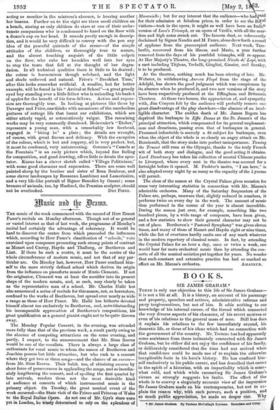war* anb . fjj !mina.
Tax music of the week commenced with the second of Herr Ernest Pauer's recitals on Monday afternoon. Though not of so general or varied interest as that of last week,.the programme of Monday's recital had certainly the advantage of coherency. It would be hard to discoverthe centre from which proceeded the influences which, according to Herr Patter's classification of "schools," were exercised upon composers presenting such strong points of contrast as Mozart and Czerny, Haydn and Thalberg, or Beethoven and Liszt. If there be such a centre, it must be the centre of the whole circumference of modern music, and not that of any par- ticular arc. On Monday last, however, Herr Feuer confined him- self to the more strictly defined school which derives its origin from the influence on pianoforte music of Muzio Clementi. If not the originator, Clementi was at least the moulder into its present shape of the modern sonata, and, as such, may clearly be taken as the representative man of a school. Mr. Charles Halle has also announced a series of recitals for this season, not, as heretofore, confined to the works of Beethoven, but spread over nearly as wide a range as those of Herr Pauer. Mr. Salle has hitherto devoted himself almost too exclusively to Beethoven, and, notwithstanding his incomparable appreciation of Beethoven's compositions, his great qualification as a general pianist ought not to be quite thrown away.
The Monday Popular Concert, in the evening, was attended more fully than that of the previous week, a result partly owing to the absence of competing attractions on the same evening, and partly, I suspect, to the announcement that Mr. Sims Reeves would be one of the vocalists. There is always a large class of enthusiasts for vocal music to whom the names of Reethoven and Joachim possess but little attraction, but who rush to a concert where they get two or three songs—and the chance of an encore— from Mr. Sims Reeves. Their habit, too, of obtaining encores by sheer force of perseverance in applauding the songs, and so inordin- ately lengthening the concert, and of spoiling the first quartet by late arrivals, renders them not the most desirable kind of audience at concerts of which instrumental music is the primary object. On Tuesday, the great musical event of the week occurred—the State visit of the Prince and Princess of Wales to the Royal Italian Opera. As not one of Mr. Gye's stars were yet in London, he wisely determined to rely on the splendour of lifasaniello ; but for any interest that the audience—who for their admission at fabulous prices, in order to see the R al visitors—took in the opera, it might as well have been an Italian version of Love's Triumph, or an opera of Verdi's, with all the murk ders and high notes struck out. The famous duet, so vehemently declaimed by Signor Naudin and M. Faure, alone drew forth a round of applause from the preoccupied audience. Next week, Tam- berlik, recovered from his illness, and Mario, a year further removed from the days of his youthful triumphs, will re-appear. At Her Majesty's Theatre, the long-promised Nicolo de' Lapi, with a cast including Titjiens, Trebelli, Giuglini, Gassier, and Santley, is to be produced.
At the theatres, nothing much has been stirring of late. Mr. Webster, in withdrawing Aurora Floyd from the stage of the Adelphi, has shown the good judgment which was conspicuous by its absence when he produced it, and two new versions of the story have been respectively produced at the Effingham and Britannia Theatres. At these two houses, the appreciation of, and sympathy with, Jim Conyers felt by the audience will probably remove one great disadvantage of the play elsewhere—the absence of an intel- ligible character. The sudden death of Mr. James Rogers has deprived the burlesque in Effie Deans at the St. James's of the principal attraction, which compensated for its general unpleasant- ness and dreariness, passing even that of burlesques in general. Presumed infanticide is scarcely a fit subject for burlesque, even when the object of the whole is so clearly an angry attack on Mr. Boucicault, that the story sinks into perfect unimportance. Taming the Truant still runs at the Olympic, than s to the truly French wit of both story and dialogue, and the good acting it obtains. Lord Dundreary has taken his collection of mental Chinese puzzles to Liverpool, where every seat in the theatre was secured for a fortnight before it opened. M. Fechter's motto, " I am here," is also adopted every night by as many as the capacity of the Lyceum will permit.
The close of the season at the Crystal Palace gives occasion for some very interesting statistics in connection with Mr. Manns's admirable orchestra. Many of the Saturday frequenters of the Palace are, perhaps, unaware that, slightly reduced in numbers, it performs twice on every day in the week. The amount of music thus performed in the course of the year is almost incredible. During the season just over, for example, something like two hundred pieces, by a wide range of composers, have been given, and a few statistics to show their general character may not be out of place. Beethoven's " Pastoral Symphony" was given eleven times, and many of those of Mozart and Haydn eight or nine times, while the list of overtures hardly omits one of any mark whatever in the modern repertory of classical music. In fact, by attending the Crystal Palace for an hour a day, once or twice a week, one would hear far more orchestral music than by attending the con- certs of all the musical societies put together for years. No wonder that such constant and extensive practice has had so marked an
effect on Mr. Manna's orchestra. AMATEUR.






























 Previous page
Previous page